
Healthy nuts are types of nuts that are considered to be nutritious and beneficial for human health when consumed in moderation. Some examples of healthy nuts include almonds, walnuts, pistachios, cashews, and peanuts. These nuts are rich in protein, healthy fats, fiber, vitamins, and minerals, which can provide various health benefits, such as reducing the risk of heart disease, improving brain function, promoting weight loss, and regulating blood sugar levels.
However, it’s important to consume nuts in moderation, as they are also high in calories and can lead to weight gain if consumed excessively.
1. Pistachios
Pistachios are a type of nut that originated in the Middle East and are now cultivated in many parts of the world. They are high in protein, fiber, healthy fats, and various vitamins and minerals. Pistachios are also rich in antioxidants and have been linked to several health benefits, including improving heart health, aiding in weight management, and reducing the risk of certain chronic diseases.
Pistachios Benefits:
- Protects Against Hypertension: Pistachios have been shown to protect against hypertension, or high blood pressure, due to their high potassium content.
- Source Of Vitamins & Minerals: Pistachios are a great source of vitamins and minerals such as vitamin B6, thiamine, phosphorus, and magnesium.
- Facilitates Digestion: Pistachios can also facilitate digestion due to their high fiber content, which can help promote bowel regularity and prevent constipation. Additionally, the healthy fats found in pistachios can also help improve digestion and reduce inflammation in the gut.
- Great For Diabetic Patients: Pistachios are a great snack option for diabetic patients as they have a low glycemic index, meaning they don’t cause a sharp increase in blood sugar levels. The fiber and healthy fats in pistachios can also help regulate blood sugar levels.
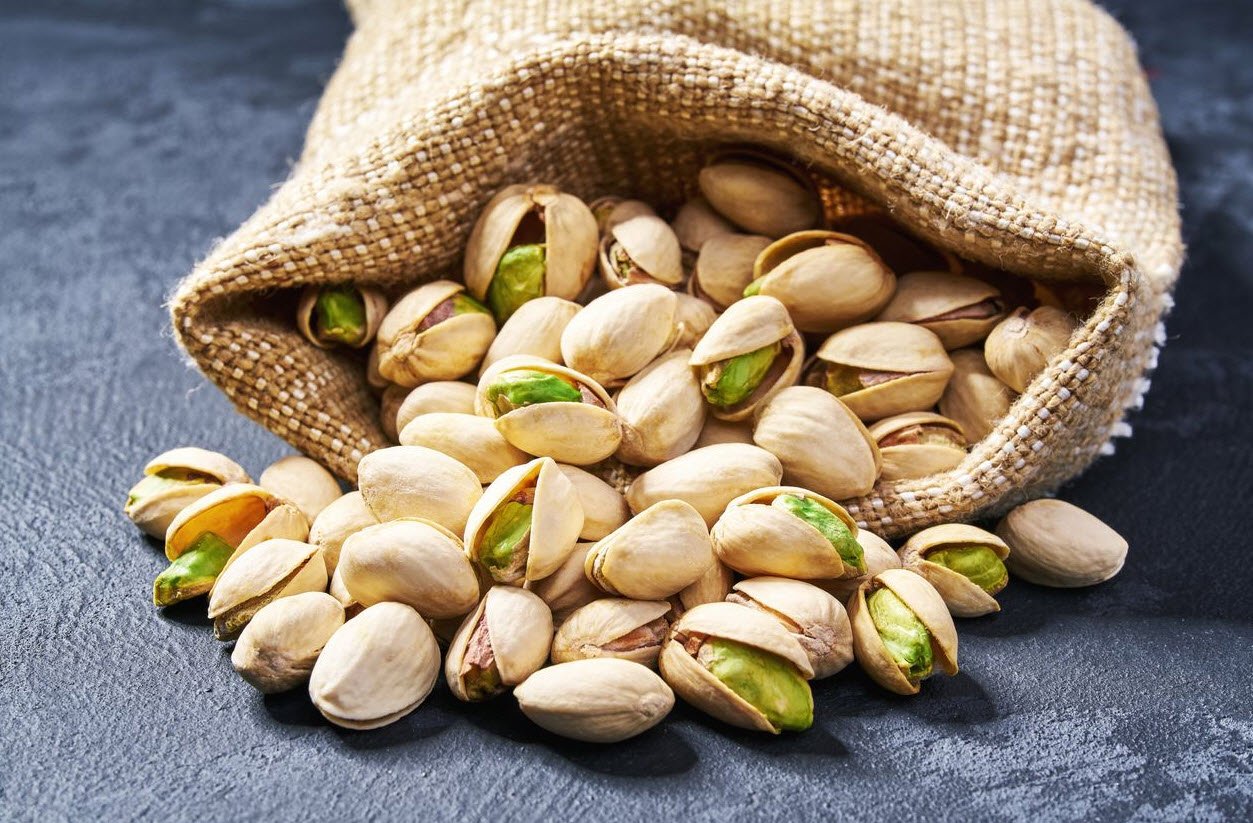
2. Hazelnuts
Hazelnuts, also known as filberts, are a type of nut that are native to Europe and Asia. They are a good source of protein, fiber, healthy fats, and various vitamins and minerals, such as vitamin E and magnesium. Hazelnuts are also rich in antioxidants and have been linked to several health benefits, including improving heart health, aiding in weight management, and reducing inflammation in the body.
Hazelnuts Benefits:
- High in Fibre: Hazelnuts are high in fiber, with about 3 grams of fiber in a one-ounce serving. The fiber in hazelnuts can help promote bowel regularity, prevent constipation, and reduce the risk of several chronic diseases, such as heart disease, diabetes, and certain types of cancer. The fiber in hazelnuts can also help lower cholesterol levels and improve blood sugar control.
- Regulates Digestion: The fiber content in hazelnuts can help regulate digestion by promoting the growth of beneficial gut bacteria and preventing constipation. This can improve gut health and reduce the risk of various digestive disorders.
- Source of Vitamins & Minerals: Hazelnuts are a good source of vitamins and minerals, including vitamin E, magnesium, manganese, and copper. Vitamin E is an antioxidant that helps protect cells from damage, while magnesium is essential for bone health and muscle function. Copper and manganese are also important for overall health and well-being.
- Make Bones Stronger: Hazelnuts are a good source of magnesium, which is important for bone health. Magnesium is essential for the absorption and metabolism of calcium, which is crucial for building and maintaining strong bones. Consuming hazelnuts regularly can help improve bone health and prevent osteoporosis.

3. Brazil Nuts
Brazil nuts are a type of nut that are native to South America. They are a rich source of protein, fiber, healthy fats, and various vitamins and minerals, such as selenium, magnesium, and vitamin E. Brazil nuts are also rich in antioxidants and have been linked to several health benefits, including improving heart health, boosting brain function, and reducing inflammation in the body.
Brazil Nuts Benefits:
- Helps Reduce Bad Cholesterol Keeps Heart Healthy: Brazil nuts contain healthy fats and selenium, which can help reduce bad cholesterol levels and keep the heart healthy.
- Improves Neural Health: Brazil nuts are a good source of magnesium, which is important for nerve and muscle function, and vitamin E, which has been linked to improved brain function and reduced risk of cognitive decline. Consuming Brazil nuts regularly can help improve neural health and prevent neurodegenerative diseases.
- Regulates Blood Sugar: Brazil nuts are a good source of healthy fats and fiber, which can help regulate blood sugar levels and improve insulin sensitivity. Consuming Brazil nuts regularly may also reduce the risk of developing type 2 diabetes.
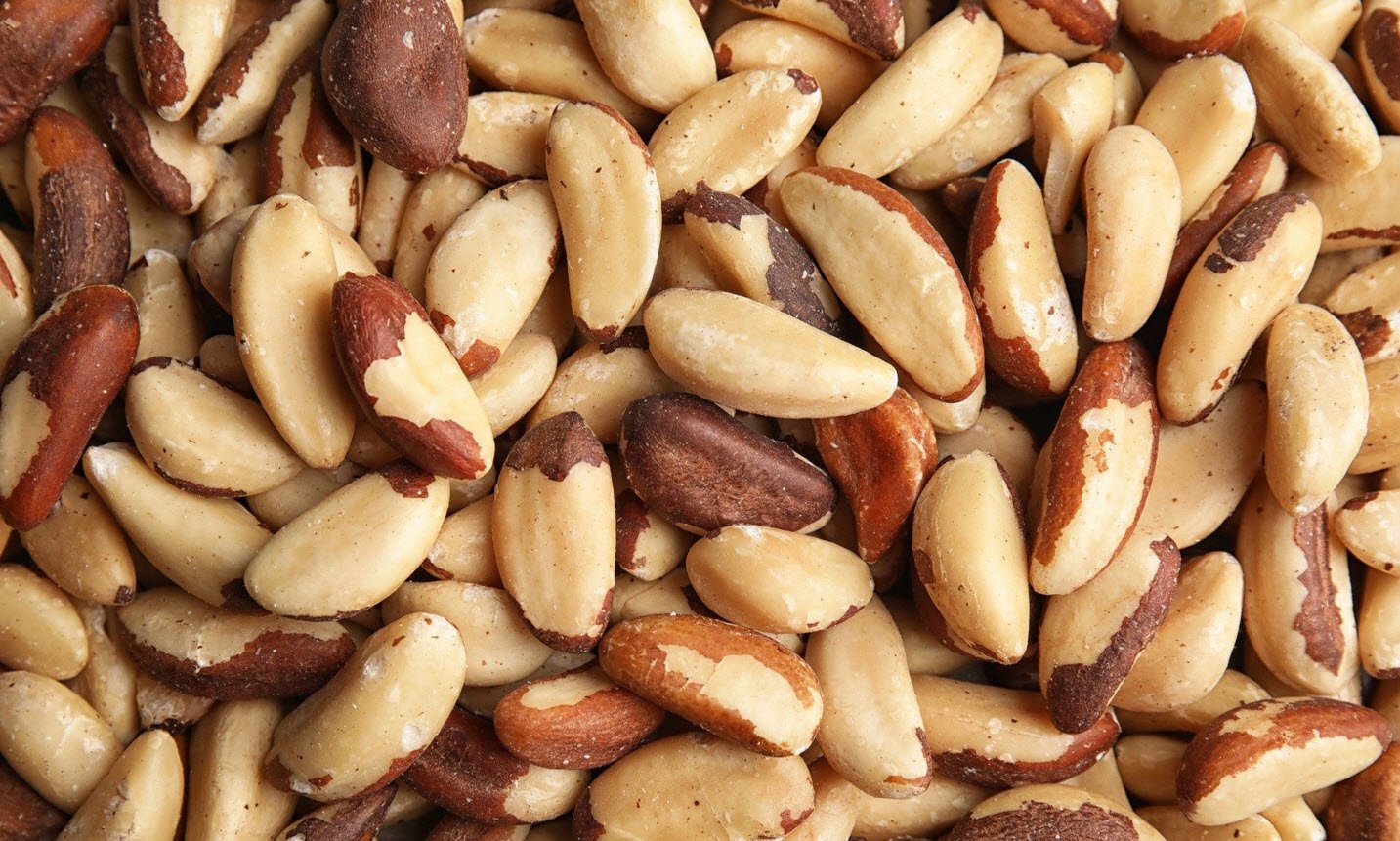
4. Cashew Nuts
Cashew nuts are a type of nut that are native to Brazil. They are a good source of protein, healthy fats, and various vitamins and minerals, such as magnesium, copper, and vitamin K. Cashews are also rich in antioxidants and have been linked to several health benefits, including improving heart health, aiding in weight management, and reducing inflammation in the body.
Cashew Nuts Benefits:
- Keeps Heart Healthy: Cashews contain healthy fats, fiber, and magnesium, which can help improve heart health by reducing cholesterol levels, promoting blood vessel health, and regulating blood pressure. Consuming cashews regularly may also reduce the risk of heart disease.
- Contains Anti-oxidants: Cashews are a good source of antioxidants, such as vitamin E, which can help protect cells from damage caused by free radicals. Antioxidants may also help reduce inflammation in the body and improve overall health and well-being.
- Increases Immunity: Cashews are a good source of zinc, which is important for immune system function. Zinc helps the body produce and activate immune cells that fight off infections and diseases. Consuming cashews regularly may help boost immunity and reduce the risk of illnesses.
- Make Bones Stronger: Cashews are a good source of magnesium, which is important for bone health. Magnesium works with calcium to build and maintain strong bones. Consuming cashews regularly may help improve bone density and reduce the risk of osteoporosis.

5. Almonds
Almonds are a type of nut that are native to the Middle East and South Asia. They are a good source of healthy fats, fiber, and various vitamins and minerals, such as vitamin E, magnesium, and potassium. Almonds are also rich in antioxidants and have been linked to several health benefits, including improving heart health, aiding in weight management, and reducing inflammation in the body.
Almonds Benefits:
- Lowers Ldl & Increase Hdl: Almonds are rich in healthy fats, such as monounsaturated and polyunsaturated fats, which can help reduce LDL (“bad”) cholesterol levels and increase HDL (“good”) cholesterol levels. Consuming almonds regularly may also reduce the risk of heart disease.
- Process Glucose in The Body: Almonds are a good source of magnesium, which is important for regulating blood sugar levels. Magnesium helps the body process glucose and insulin efficiently, which may help reduce the risk of type 2 diabetes and improve overall blood sugar control.
- Improves Brain Function: Almonds are a good source of vitamin E, which has been linked to improved brain function and a reduced risk of cognitive decline. Additionally, the healthy fats and fiber in almonds may help improve memory and overall cognitive performance.
- Rich in Magnesium: Almonds are a rich source of magnesium, a mineral that is important for bone health, regulating blood sugar levels, and muscle function. Consuming almonds regularly may help improve magnesium levels in the body and promote overall health.
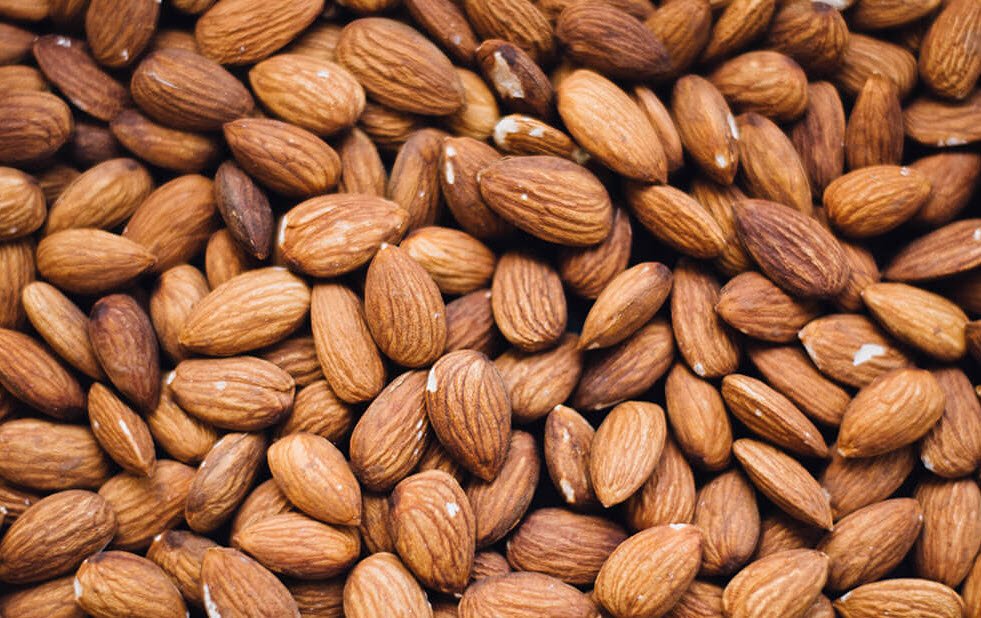
6. Chestnuts
Chestnuts are a type of nut that are rich in fiber, vitamins, and minerals. They are a good source of vitamin C, which is important for immune system function and skin health. Chestnuts are also low in fat and calories compared to other nuts, making them a good choice for weight management.
Chestnuts Benefits:
- Rich in Foliate: Chestnuts are a good source of folate, a B-vitamin that is important for cell growth and development. Adequate folate intake during pregnancy is crucial for fetal development and may help reduce the risk of birth defects.
- High Vitamin C And A: Chestnuts are a rich source of vitamin C, which is important for immune system function and skin health. They also contain vitamin A, which supports healthy vision and immune system function, and may help protect against chronic diseases.
- Contains Potassium & Proteins: Chestnuts are a good source of potassium, a mineral that is important for heart and muscle function. They also contain proteins, which are essential for building and repairing tissues in the body, and may help promote satiety and weight management.
- Increase Metabolism: Chestnuts contain several nutrients, such as vitamin B6, thiamine, and riboflavin, that are involved in energy production and metabolism. Adequate intake of these nutrients may help boost metabolism and promote overall health and well-being.
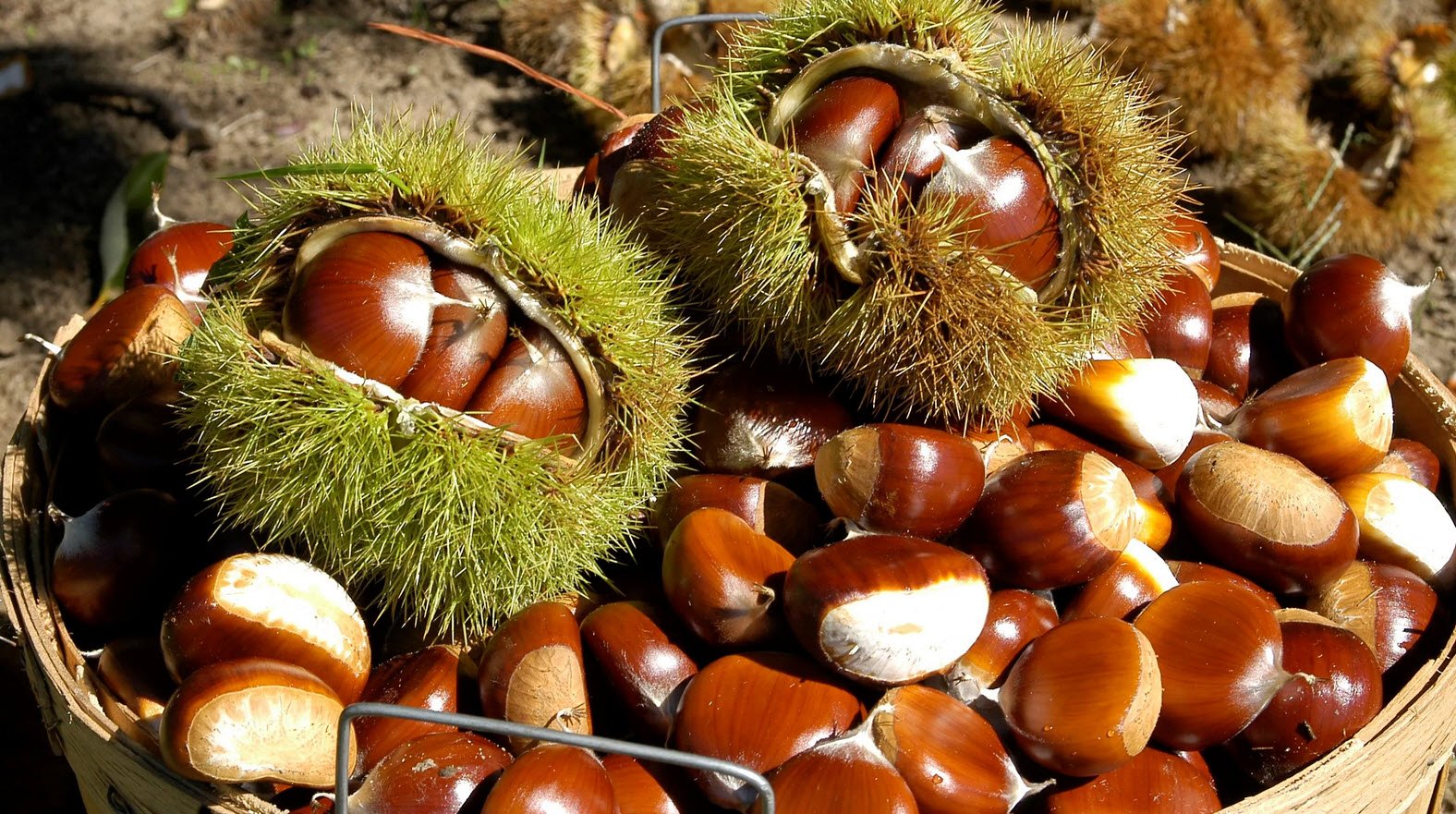
7. Walnuts
Walnuts are a good source of heart-healthy monounsaturated and polyunsaturated fats, which may help reduce the risk of heart disease. They are also rich in antioxidants, protein, fiber, and micronutrients like magnesium, phosphorus, and copper, which are important for overall health and well-being.
Walnuts Benefits:
- Rich in Fibre & Protein: Walnuts are rich in both fiber and protein, which can help promote satiety, regulate digestion, and support healthy blood sugar levels. Including walnuts in your diet may also help reduce the risk of chronic diseases, such as diabetes, cancer, and heart disease.
- Provides Omega 3 Fatty Acids: Walnuts are a good source of omega-3 fatty acids, which are essential fats that cannot be produced by the body and must be obtained through the diet. These healthy fats may help improve brain function, reduce inflammation, and lower the risk of chronic diseases.
- Contains Antioxidant & Vitamin B: This food item contains both antioxidants and vitamin B, which are important for overall health and well-being.
- Promotes Weight Loss: This food item has been shown to promote weight loss, likely due to its high fiber content and ability to increase feelings of fullness, leading to reduced calorie intake.

8. Pecans
Pecans are a type of tree nut that are rich in nutrients, including healthy unsaturated fats, protein, fiber, and a variety of vitamins and minerals. They are also a good source of antioxidants and have been associated with various health benefits, including improved heart health and reduced inflammation.
Pecans Benefits:
- Rich in Vitamin E, C & K: Pecans are a good source of several vitamins, including vitamin E, vitamin C, and vitamin K. These vitamins are important for various aspects of health, including immune function, skin health, and blood clotting.
- Rich in Foliate: Pecans are also a good source of folate, a B-vitamin that plays a key role in DNA synthesis and cell division. Folate is important for fetal development during pregnancy and may also have other health benefits.
- Richin Thiamine: Pecans are a good source of thiamine, a B-vitamin that helps convert food into energy and is important for nerve and muscle function. Thiamine deficiency can lead to serious health problems.
- Contains Riboflavin & Niacin: Pecans also contain riboflavin and niacin, two B-vitamins that are important for energy production, metabolism, and other functions in the body. These vitamins also have antioxidant properties.
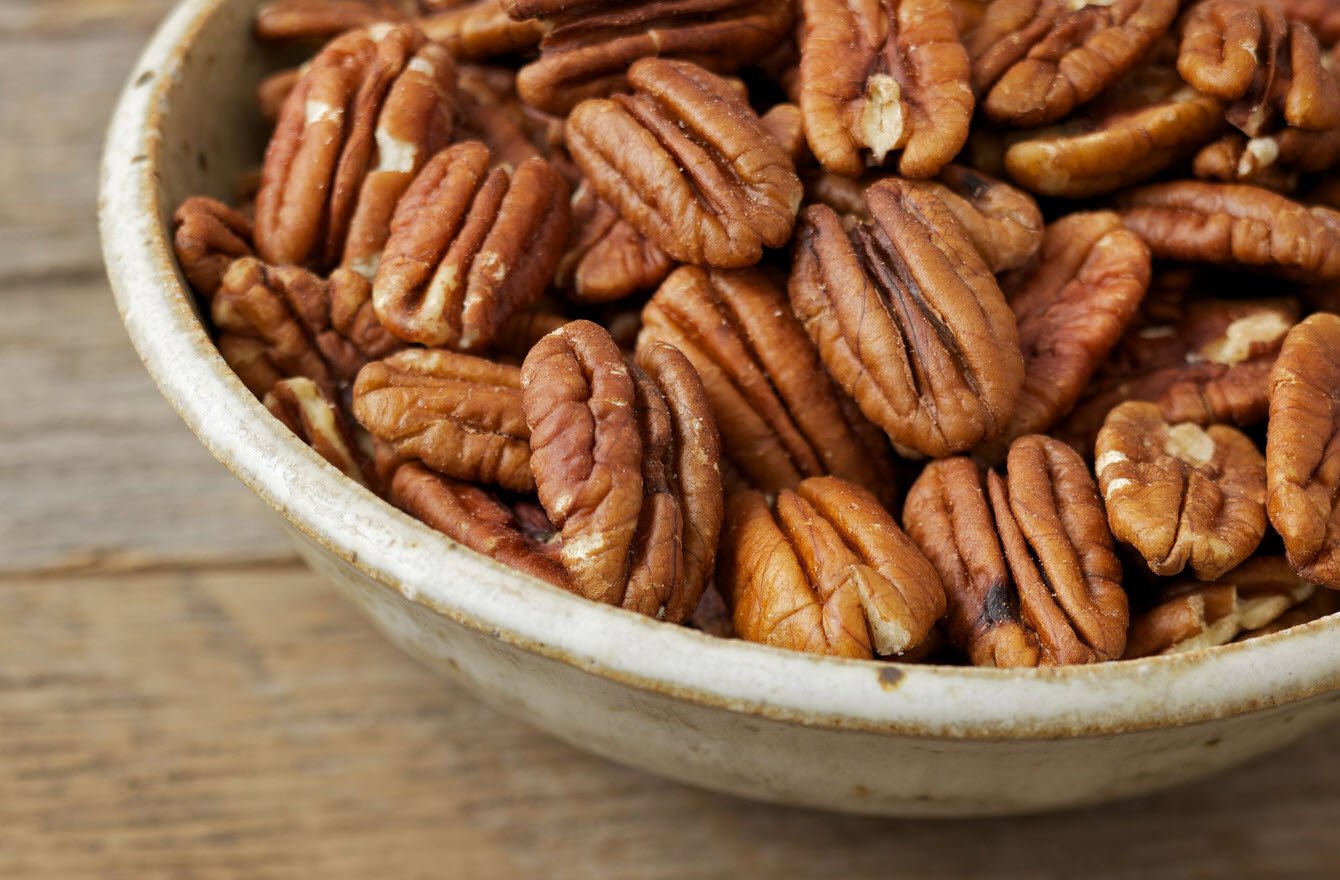
9. Peanuts
Peanuts are a type of legume that are rich in nutrients, including protein, healthy unsaturated fats, fiber, and a variety of vitamins and minerals. They are also a good source of antioxidants and have been associated with various health benefits, including improved heart health and reduced inflammation.
Peanuts Benefits:
- Contains Essential Mufa: Peanuts are a good source of monounsaturated fatty acids (MUFA), which are considered essential fats that the body needs but cannot produce on its own. MUFAs have been linked to improved heart health and other health benefits.
- Rich in Fibre: Peanuts are also a good source of dietary fiber, which can help promote digestive health, reduce cholesterol levels, and improve blood sugar control. High fiber intake is also associated with reduced risk of chronic diseases.
- Increases Metabolism Rate: Peanuts contain various nutrients that can help increase metabolism rate, such as protein, fiber, and B-vitamins. A faster metabolism can help the body burn more calories and promote weight loss.
- Rich in Protein: Peanuts are a good source of protein, which is important for building and repairing tissues, supporting immune function, and maintaining muscle mass. They are a great plant-based protein option.

10. Macadamia Nuts
Macadamia nuts are a type of tree nut that are rich in nutrients, including healthy unsaturated fats, protein, fiber, and a variety of vitamins and minerals. They are also a good source of antioxidants and have been associated with various health benefits, including improved heart health and reduced inflammation.
Macadamia Benefits:
- Rich in Vitamin A: Macadamia nuts are a good source of vitamin A, which is important for healthy vision, immune function, and skin health. Vitamin A also has antioxidant properties and may have other health benefits.
- Contains Anti-oxidants: Macadamia nuts are a good source of antioxidants, which can help protect the body against oxidative stress and reduce the risk of chronic diseases. These antioxidants include vitamin E, flavonoids, and other phytochemicals.
- Protects Against Artery Disease: Macadamia nuts contain compounds that may help protect against artery disease by improving cholesterol levels and reducing inflammation. These effects may be due to the high content of healthy fats and antioxidants.
- Contains Selenium: Macadamia nuts are a good source of selenium, a mineral that plays a key role in immune function, thyroid health, and reproduction. Selenium also has antioxidant properties and may have other health benefits.










This Post Has One Comment